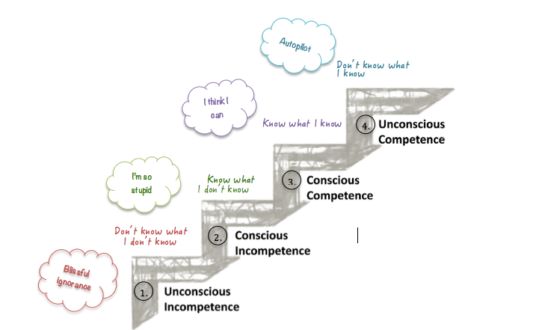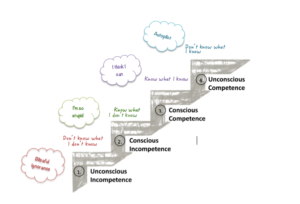

Learning can be overwhelming
There is a look I see a lot in my classes, the slightly glazed eyes and frowns of bewilderment. It’s the face of overwhelm. It happens to almost every student in every class I teach, even those students who re-sit the courses. For some people, it starts on day one and lasts the whole week, some it will start on day three, and it feels like it comes completely out of the blue.
In anything you learn, especially rapidly, overwhelm is inevitable. You have two choices when you encounter it:
- Go to Ego; get frustrated, blame the course, blame the teacher, tell yourself you are useless, tell yourself you are dumb, count how many things you have wasted (time, money, optimism) = give up.
- Go to Creator; stay calm, be gentle with yourself, ask questions, get curious, allow time to take its course, practice different scenarios in different ways, work in a team to practice, re-sit the course = massive learning.
It doesn’t matter when you experience overwhelm, what matters is you stay in your seat and you keep listening, keep practising, you will get it. Believe me, I know what it’s like to be the last person in the room to figure out what’s going on. Labelled as having learning difficulties and being treated like a dummy in primary school, I know it’s the worst feeling in the world. I don’t teach like that, with labels and ‘dummies,’ my courses are dummy proof and my lifetime re-sit policy is designed so you can get more and more out of the material by revisiting, relearning and exploring the information.
You’re Not Dumb
I was never dumb, and neither are you, we just need to push through that feeling, trust that our brains are working and stay with it.
I factor overwhelm into my classes and prepare my students to build up to the really big stuff gradually, but I don’t avoid it. If you are feeling overwhelmed, I get excited, because it means it’s working. That feeling means you are learning new things, it’s what happens when we realise there is stuff we don’t know.
I didn’t know that I didn’t know that.
Why do we get overwhelmed?
Why does overwhelm happen? Our brains like to think they know a lot about everything. Actually, there is so much that we haven’t even started to learn yet, our brains just can’t factor it all in. In order to cope with all that’s out there, our brain covers things over, like putting on blinkers, neatly disguising the unmapped areas and glossing over anything questionable. It’s called Unconscious Incompetence.
Overwhelm happens when we consciously focus on those blank spots. We realise that there is A LOT of blank space we now need to make room for, there is so much discovery and understanding and application to be done where before, it appeared seamless. Where the $!*^ did that giant void come from? How am I ever going to learn all that? Where do I even start? It’s called conscious incompetence (learning stage 2).
There is a really long germination time between getting familiar with all the things you don’t know about and working to get good at them (stage 3. conscious competence). You need to take time to discover all the things you don’t know in the new area. Want to get really good at something? Spend a heap of time just getting to know all the things you didn’t know.
During the second stage of learning, doors of opportunities and choice are flung open in your unconscious mind, new possibilities are being strung together and all the old programming is being re-evaluated, tested and rewritten.
That’s a heap of work for your brain to be doing while you are listening; no wonder your feeling fuzzy between the ears. The more you listen the more your brain works. It will keep working while you sleep, it will keep working for months and months after your course is done. The typical time it takes for your brain to fully reconcile everything I teach in my Excellence Now course is three to six months. MONTHS!
People often feel that when they learn something they need to learn it right then. They expect that learning starts at stage three, that they should be consciously competent to use what they have learned immediately. They expect that they will sit down, take notes and walk away a different person. I think The Matrix really touched on people’s desire for instant learning by showing information (martial arts) being downloaded into Neo’s brain via cable. Yes, we’d all love to know martial arts perfectly in an hour, download a language and speak it fluently, but actually, it takes years and years of technique, training, practice and discipline. Decades of it. Without that discipline, can you ever actually know something?
I’m sorry we don’t live in the Matrix, but I do have the next best method with Rapid Learning Techniques.
Embrace overwhelm.
Accept that stage one exists, that actually, oops, you don’t know everything. Enjoy stage two, explore your unknown world and chart it carefully. Give yourself time to learn, give your brain time to adapt, give yourself a break when you don’t get it straight away. What I see, time and time again, is that brilliant results and significant change from Excellence Now happened three to six months AFTER the course is completed.
I guarantee you, overwhelm is a good thing, although it feels momentarily uncomfortable, sticking with it means you advance to the next level, and keep that knowledge and skill for life.
If you quit, at any level, you lose.
In neuro linguist programming (NLP) training we understand that our unconscious mind will always choose the path of least resistance, and for many of us, the path of least resistance is to quit. Do that and you lose, worse, you reinforce that quitting is the best option so next time the need to quit will feel stronger.
On the flip side, the more often you override it and be okay about the feeling of overwhelm, the easier it will be to stay and finish what you started. Even a serial quitter can change their patterns and effectively learn if they ride out the feeling of overwhelm.
Mistakes are the most useful thing you can make in your life.
A mistake is just testing the limits of what you don’t know.
It’s not just me saying that overwhelm is good for learning, studies where mice were placed in enriching maze environments show that brain density – literally the size and complexity of your brain- increases with suggestions of improved cognitive performance.
You just need to trust that overwhelm is step one in the learning process. That you are going through the steps of learning in order. You are getting it. If you are experiencing overwhelm, you are well and truly on your way to the next level and eventually, you will master it.
Matt Catling







